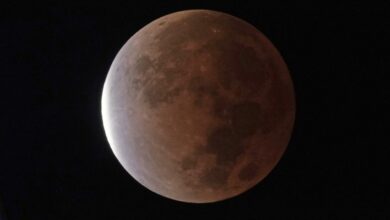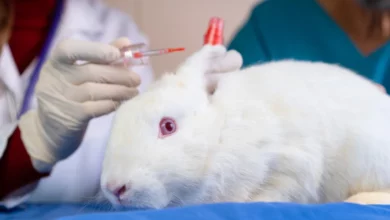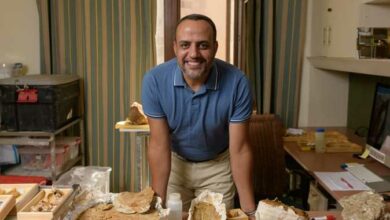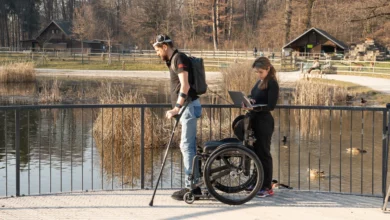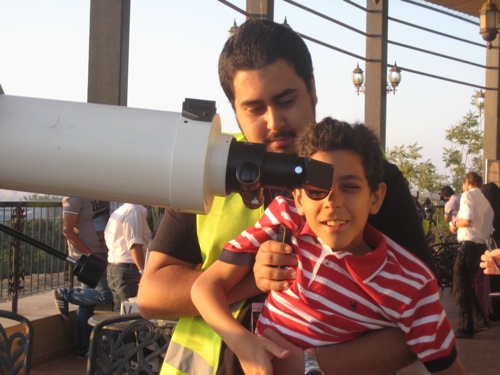
“It was amazing!” exclaimed Mohamed Rouby after watching a small black dot, the planet Venus, glide slowly across the sun. It was his first time looking through a telescope, and the only time he’ll ever see the transit of Venus.
The transit of Venus is a rare astronomical event that occurs only twice per century, when Venus passes between the Earth and the sun. The next transit of Venus will happen in 2117, making this the final opportunity in our lifetime to witness the occurrence.
Mohamed’s mother, Yasmine Rouby, says she brought him to the event because she wanted him to get away from the TV and his Playstation.
“He likes things like history and discovery, so that’s why we came,” she explains.
Mohamed says seeing the transit of Venus has made him more interested in astronomy.

This is the very response that Dr. Alaa Ibrahim, assistant professor of space astrophysics at the American University in Cairo, hopes to elicit from those who attend AUC’s science outreach events.
For the last few years, Ibrahim and his student volunteers have been taking science outside the university campus through their outreach program in order to make it more accessible to the general public.
“Science has never been about dictating. It is about engaging and about linking to nature. So, through events like this we are taking science back to its roots,” says Ibrahim.
Ibrahim, along with 15 dedicated student volunteers who love science, organized a celebration of the transit of Venus in conjunction with the AUC Observatory and the School of Sciences and Engineering.
The event kicked off in Giza at Dreamland Park’s Mountain Restaurant on 5 June, with a lecture about the transit of Venus by Ibrahim followed by stargazing and a viewing of the planet Saturn and the moon.
Ibrahim says he chose this location because it’s the highest point in Cairo, and because there’s less dust and fewer particles in the air.
The viewing of the transit of Venus took place early in the morning on 6 June. Guests received solar glasses to view the astronomical event with the naked eye, but the student volunteers also made telescope viewing of the event available.
This was only the seventh transit of Venus that has been observed from Earth. According to Ibrahim, the transit of Venus has been instrumental in helping scientists learn about the size of the solar system, and in determining the distance between the sun and the Earth.
Ibrahim says he was pleased with the turnout of dozens of people, particularly given that the event began at 5 am. He adds that he was also pleased to see people from a variety of social backgrounds, and a good number of children.
“I call this outreach 2.0. Outreach is a way to excite interest and motivate future scientists and engineers,” he says.
Two of the student volunteers, junior Ramy Khalid al-Adly and freshman Sandy al-Moghazy, are a prime examples of how this approach works.
Both are mechanical engineering students at AUC. Adly is the president of the astronomy club, and says he originally became interested in astronomy through some of AUC’s science outreach events. Moghazy, who Ibrahim calls AUC’s up-and-coming astronomy star, says she’s loved astronomy since she was a child.
They both enjoy the outreach events, and helping the Egyptian public learn about astronomy.
“It’s very nice to actually show the people how it all works. They really seem to enjoy it, so that was a great part of it. It was successful,” Adly says of the event.
This summer Adly will attend a program at Harvard University in the US, where he will work on a project involving research about the beginning of the universe. Ibrahim says AUC has sent students to Harvard to conduct research for the last three summers.

During the viewing of the transit of Venus, a mother and her daughter approached Sherif Ammar, one of the student volunteers as well as a biology teaching assistant and master’s student at AUC. She asked Ammar if the tiny black dot she saw on top of the sun was Venus.
“Yeah, that’s it,” he tells her, and she smiles. Making people smile is what he says he loves about doing these kinds of events.
“You can see people interact with this, so that’s promising. It’s something new,” he adds.
Ammar thinks there needs to be more of a focus on science in Egyptian schools.
Through the science outreach program at AUC, Ibrahim says a small cultural shift is taking place. And he views the outreach program from a big picture perspective of building a scientifically literate and appreciative culture.
“To be an informed and effective citizen in the 21st century, you need to be scientifically literate about nature, about the universe, and about sustainability issues,” Ibrahim says.
“People are genuinely and intrinsically interested in nature and the cosmos, but they need an outlet, and they need opportunities,” he adds.
This is what Ibrahim says drives him to do outreach programs like the transit of Venus event. He hopes that he, along with his army of student volunteers, will continue to engage Egyptians in science, and get them excited about it.

